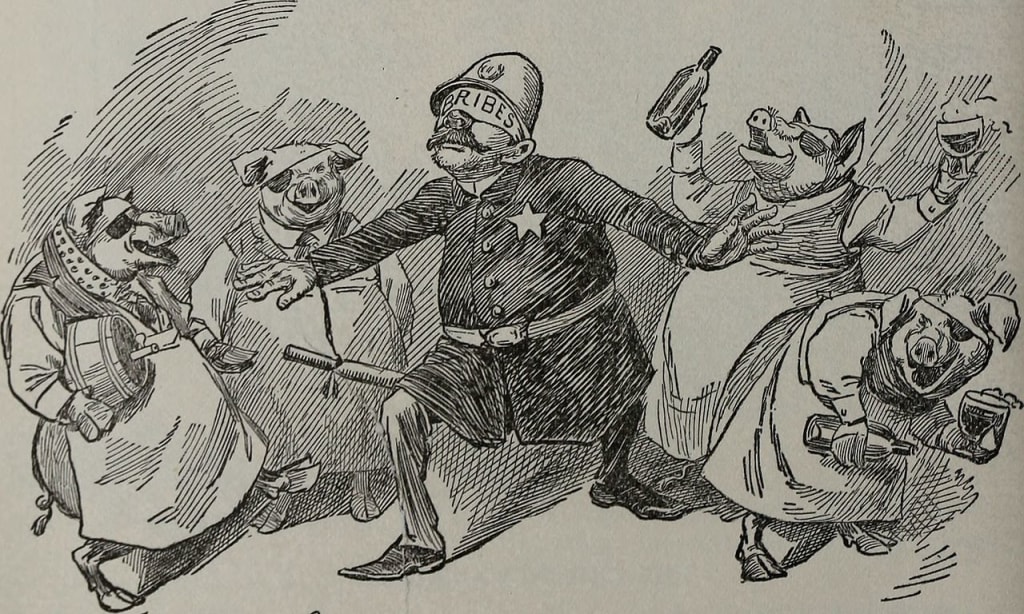Corruption
"Corrupt" redirects here. For other uses, see Corrupt (disambiguation).

Corruption is a form of dishonesty or a criminal offense which is undertaken by a person or an organization which is entrusted with a position of authority, in order to acquire illicit benefits or abuse power for one's personal gain. Corruption may involve many activities which include bribery and embezzlement, and it may also involve practices which are legal in many countries.[1] Political corruption occurs when an office-holder or other governmental employee acts in an official capacity for personal gain. Corruption is most common in kleptocracies, oligarchies, narco-states, and mafia states.[citation needed]
Corruption and crime are endemic sociological occurrences which appear with regular frequency in virtually all countries on a global scale in varying degrees and proportions. Each individual nation allocates domestic resources for the control and regulation of corruption and the deterrence of crime. Strategies which are undertaken in order to counter corruption are often summarized under the umbrella term anti-corruption. Additionally, global initiatives like the United Nations Sustainable Development Goal 16 also have a targeted goal which is supposed to substantially reduce corruption in all of its forms.[2] Stephen D. Morris,[3] a professor of politics, wrote that political corruption is the illegitimate use of public power to benefit a private interest. Economist Ian Senior defined corruption as an action to secretly provide a good or a service to a third party to influence certain actions which benefit the corrupt, a third party, or both in which the corrupt agent has authority.[4] World Bank economist Daniel Kaufmann[5] extended the concept to include "legal corruption" in which power is abused within the confines of the law—as those with power often have the ability to make laws for their protection. The effect of corruption in infrastructure is to increase costs and construction time, lower the quality and decrease the benefit.[6]
Corruption can occur on different scales. Corruption ranges from small favors between a small number of people (petty corruption),[7] to corruption that affects the government on a large scale (grand corruption), and corruption that is so prevalent that it is part of the everyday structure of society, including corruption as one of the symptoms of organized crime (Systemic corruption).
A number of indicators and tools have been developed which can measure different forms of corruption with increasing accuracy;[8][9] but when those are impractical, one study suggests looking at bodyfat as a rough guide after finding that obesity of cabinet ministers in post-Soviet states was highly correlated with more accurate measures of corruption.[10][11]
Petty corruption
Petty corruption occurs at a smaller scale and takes place at the implementation end of public services when public officials meet the public. For example, in many small places such as registration offices, police stations, state licensing boards,[12][13] and many other private and government sectors.
Grand corruption
Grand corruption is defined as corruption occurring at the highest levels of government in a way that requires significant subversion of the political, legal and economic systems. Such corruption is commonly found in countries with authoritarian or dictatorial governments but also in those without adequate policing of corruption.[14]
The government system in many countries is divided into the legislative, executive and judicial branches in an attempt to provide independent services that are less subject to grand corruption due to their independence from one another.[15]
Systemic corruption
Systemic corruption (or endemic corruption)[16] is corruption which is primarily due to the weaknesses of an organization or process. It can be contrasted with individual officials or agents who act corruptly within the system.
Factors which encourage systemic corruption include conflicting incentives, discretionary powers; monopolistic powers; lack of transparency; low pay; and a culture of impunity.[17] Specific acts of corruption include "bribery, extortion, and embezzlement" in a system where "corruption becomes the rule rather than the exception."[18] Scholars distinguish between centralized and decentralized systemic corruption, depending on which level of state or government corruption takes place; in countries such as the Post-Soviet states both types occur.[19] Some scholars argue that there is a negative duty[clarification needed] of western governments to protect against systematic corruption of underdeveloped governments.[20][21]
Corruption has been a major issue in China, where society depends heavily on personal relationships. By the late 20th century that combined with the new lust for wealth, produced escalating corruption. Historian Keith Schoppa says that bribery was only one of the tools of Chinese corruption, which also included, "embezzlement, nepotism, smuggling, extortion, cronyism, kickbacks, deception, fraud, squandering of public money, illegal business transactions, stock manipulation and real estate fraud." Given the repeated anti-corruption campaigns it was a prudent precaution to move as much of the fraudulent money as possible overseas.[22]
As a Post-Soviet Union country - Armenia is also facing corruption-related issues. This has been transferred to Armenia as well as other Soviet Union Member Republics as a heritage. Armenia was a pleasant exception. After the Armenian Velvet Revolution in 2018 new government made the fight against corruption an official top priority.[23] 'Anti-corruption Strategy' seemed to give results as it upgraded from 105th place in CPI score to 60th in just two years.[24]
In Latin American countries, corruption is permitted as a result of the cultural norms of the institution. In countries like the United States, there is a relatively strong sense of trust among strangers, one that is not found in Latin American countries. In Latin American countries, this trust does not exist, whereas the social norms imply that no stranger is responsible for the wellbeing or happiness of another stranger. Instead, the trust is found in acquaintances. Acquaintances are treated with trust and respect—a level of trust that is not found among acquaintances in countries like the United States. This is what permits for corruption in Latin American countries. If there is a strong enough trust within an administration that no one will betray the rest, corruptive policies will take place with ease. In the United States, this could not occur, as there is not a strong enough trust among the members of an administration to allow for corruption. In Latin American countries, there is a stronger value in individuality, which includes that of acquaintances, unlike in countries like the United States, which fails to include acquaintances.[25]
Causes
Per R. Klitgaard[26] corruption will occur if the corrupt gain is greater than the penalty multiplied by the likelihood of being caught and prosecuted.
Since a high degree of monopoly and discretion accompanied by a low degree of transparency does not automatically lead to corruption, a fourth variable of "morality" or "integrity" has been introduced by others. The moral dimension has an intrinsic component and refers to a "mentality problem", and an extrinsic component referring to circumstances like poverty, inadequate remuneration, inappropriate work conditions and inoperable or over-complicated procedures which demoralize people and let them search for "alternative" solutions.
According to a 2017 survey study, the following factors have been attributed as causes of corruption:[27]
Greed of money, desires.
Higher levels of market and political monopolization
Low levels of democracy, weak civil participation and low political transparency
Higher levels of bureaucracy and inefficient administrative structures
Low press freedom
Low economic freedom
Large ethnic divisions and high levels of in-group favoritism
Gender inequality
Poverty
Political instability
Weak property rights
Contagion from corrupt neighboring countries
Low levels of education
Lack of commitment to society
Extravagant family
Unemployment
It has been noted that in a comparison of the most corrupt with the least corrupt countries, the former group contains nations with huge socio-economic inequalities, and the latter contains nations with a high degree of social and economic justice.[28]
By sector
Corruption can occur in many sectors, whether they be public or private industry or even NGOs (especially in public sector). However, only in democratically controlled institutions is there an interest of the public (owner) to develop internal mechanisms to fight active or passive corruption, whereas in private industry as well as in NGOs there is no public control. Therefore, the owners' investors' or sponsors' profits are largely decisive.
Public corruption
Public corruption includes corruption of the political process and of government agencies such as tax collectors and the police, as well as corruption in processes of allocating public funds for contracts, grants, and hiring. Recent research by the World Bank suggests that who makes policy decisions (elected officials or bureaucrats) can be critical in determining the level of corruption because of the incentives different policy-makers face.[29]
About the Creator
Rebecca Maria
Hi! My name is Rebecca and I'm good at black and white drawing. On this site I will write interesting things and things that some of you do not know. I hope you enjoy You can write me in the comments what would interest you.Thank you .






Comments
There are no comments for this story
Be the first to respond and start the conversation.